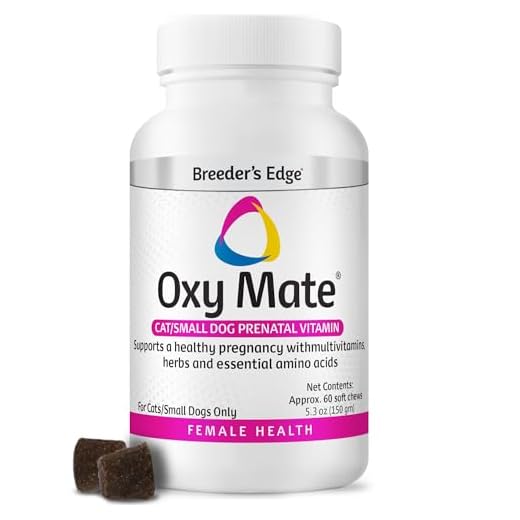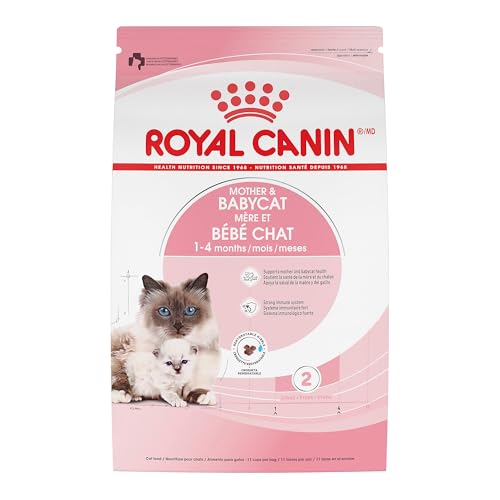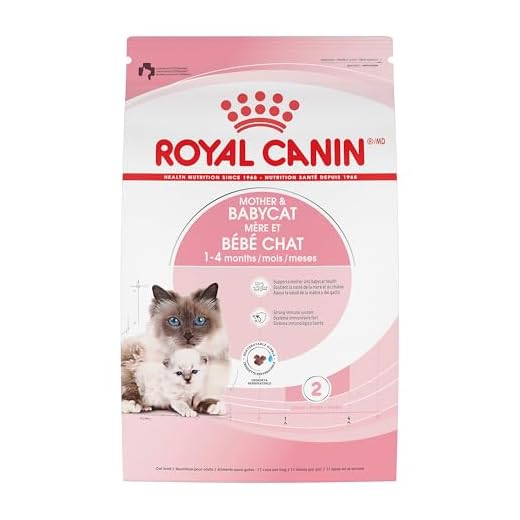



Ensure a nutritious diet tailored for expectant mothers. High-quality kitten food provides the necessary nutrients for both her and her developing offspring. Look for options rich in protein and essential vitamins.
Prepare a quiet and comfortable space for her to give birth. This area should be away from heavy foot traffic, with soft bedding and minimal disturbances. Having a designated nesting box can help her feel secure.
Monitor her health closely. Regular vet check-ups are important to detect any potential issues early. Vaccinations and parasite control should be up to date to safeguard her and her little ones.
Encourage hydration by providing fresh water at all times. Pregnant felines often need more fluids, so consider adding wet food to her diet to increase her water intake.
Limit stress by maintaining a calm environment. Avoid loud noises and sudden changes in routine. Gentle affection and quiet companionship can help her feel more at ease during this time.
Preparing Your Home for a Pregnant Feline
Establish a designated space for the expecting mother. Choose a quiet, cozy area away from the hustle and bustle of daily life. A box lined with soft blankets will provide comfort and security. Make sure this space is easily accessible, allowing her to retreat when needed.
Maintain a clean environment. Regularly check and clean her litter box to keep it hygienic. This small effort helps prevent stress and promotes a healthy atmosphere as she prepares for her little ones.
Gather necessary supplies before the arrival of the kittens. Stock up on high-quality food tailored for pregnant felines, as proper nutrition is key. Add toys and scratching posts to keep her active and entertained as she waits.
Safety First
Remove any hazardous items from her reach. Ensure that wires, small objects, and toxic plants are out of the designated area. This precaution helps create a safe haven for her and the upcoming litter.
Understanding Her Needs
Pay attention to her behavior. She may seek extra affection or become more withdrawn. Be receptive to her moods and adjust your interactions accordingly. Familiarize yourself with signs of stress or discomfort, which can be found in resources like why do cats not like tin foil.
Creating a supportive environment will help her feel secure as she prepares for motherhood. Your efforts will make a world of difference for both her and her future kittens.
Caring for a pregnant feline’s health and nutrition
Ensure a balanced diet rich in protein and essential nutrients. High-quality cat food with increased calories is vital during this stage. Look for options specifically formulated for expecting mothers to support their needs.
Hydration is key. Fresh water should always be available. Dehydration can lead to complications, so encourage drinking by providing multiple water bowls throughout your space.
Regular veterinary check-ups are crucial for monitoring health. This ensures any potential issues are addressed early. Vaccinations should be updated prior to conception, as some are not safe during gestation.
Physical activity remains important. Short, gentle play sessions help maintain muscle tone and overall well-being. Avoid strenuous activities that may cause stress or injury.
Stress reduction is necessary. Create a calm environment free from loud noises and strong odors. Some scents, such as incense, may be harmful; check if is incense toxic to cats for safety.
Monitor weight gain. While some increase is normal, excessive weight can lead to complications. Consult your vet for ideal weight targets.
Lastly, prepare for nursing by providing a cozy, quiet space. Soft bedding and a secluded area will help her feel secure and ready for the arrival of her kittens.
Ensure a nutritious diet tailored for expectant mothers. High-quality kitten food provides the necessary nutrients for both her and her developing offspring. Look for options rich in protein and essential vitamins.
Prepare a quiet and comfortable space for her to give birth. This area should be away from heavy foot traffic, with soft bedding and minimal disturbances. Having a designated nesting box can help her feel secure.
Monitor her health closely. Regular vet check-ups are important to detect any potential issues early. Vaccinations and parasite control should be up to date to safeguard her and her little ones.
Encourage hydration by providing fresh water at all times. Pregnant felines often need more fluids, so consider adding wet food to her diet to increase her water intake.
Limit stress by maintaining a calm environment. Avoid loud noises and sudden changes in routine. Gentle affection and quiet companionship can help her feel more at ease during this time.
Preparing Your Home for a Pregnant Feline
Establish a designated space for the expecting mother. Choose a quiet, cozy area away from the hustle and bustle of daily life. A box lined with soft blankets will provide comfort and security. Make sure this space is easily accessible, allowing her to retreat when needed.
Maintain a clean environment. Regularly check and clean her litter box to keep it hygienic. This small effort helps prevent stress and promotes a healthy atmosphere as she prepares for her little ones.
Gather necessary supplies before the arrival of the kittens. Stock up on high-quality food tailored for pregnant felines, as proper nutrition is key. Add toys and scratching posts to keep her active and entertained as she waits.
Safety First
Remove any hazardous items from her reach. Ensure that wires, small objects, and toxic plants are out of the designated area. This precaution helps create a safe haven for her and the upcoming litter.
Understanding Her Needs
Pay attention to her behavior. She may seek extra affection or become more withdrawn. Be receptive to her moods and adjust your interactions accordingly. Familiarize yourself with signs of stress or discomfort, which can be found in resources like why do cats not like tin foil.
Creating a supportive environment will help her feel secure as she prepares for motherhood. Your efforts will make a world of difference for both her and her future kittens.
Caring for a pregnant feline’s health and nutrition
Ensure a balanced diet rich in protein and essential nutrients. High-quality cat food with increased calories is vital during this stage. Look for options specifically formulated for expecting mothers to support their needs.
Hydration is key. Fresh water should always be available. Dehydration can lead to complications, so encourage drinking by providing multiple water bowls throughout your space.
Regular veterinary check-ups are crucial for monitoring health. This ensures any potential issues are addressed early. Vaccinations should be updated prior to conception, as some are not safe during gestation.
Physical activity remains important. Short, gentle play sessions help maintain muscle tone and overall well-being. Avoid strenuous activities that may cause stress or injury.
Stress reduction is necessary. Create a calm environment free from loud noises and strong odors. Some scents, such as incense, may be harmful; check if is incense toxic to cats for safety.
Monitor weight gain. While some increase is normal, excessive weight can lead to complications. Consult your vet for ideal weight targets.
Lastly, prepare for nursing by providing a cozy, quiet space. Soft bedding and a secluded area will help her feel secure and ready for the arrival of her kittens.
Ensure a nutritious diet tailored for expectant mothers. High-quality kitten food provides the necessary nutrients for both her and her developing offspring. Look for options rich in protein and essential vitamins.
Prepare a quiet and comfortable space for her to give birth. This area should be away from heavy foot traffic, with soft bedding and minimal disturbances. Having a designated nesting box can help her feel secure.
Monitor her health closely. Regular vet check-ups are important to detect any potential issues early. Vaccinations and parasite control should be up to date to safeguard her and her little ones.
Encourage hydration by providing fresh water at all times. Pregnant felines often need more fluids, so consider adding wet food to her diet to increase her water intake.
Limit stress by maintaining a calm environment. Avoid loud noises and sudden changes in routine. Gentle affection and quiet companionship can help her feel more at ease during this time.
Preparing Your Home for a Pregnant Feline
Establish a designated space for the expecting mother. Choose a quiet, cozy area away from the hustle and bustle of daily life. A box lined with soft blankets will provide comfort and security. Make sure this space is easily accessible, allowing her to retreat when needed.
Maintain a clean environment. Regularly check and clean her litter box to keep it hygienic. This small effort helps prevent stress and promotes a healthy atmosphere as she prepares for her little ones.
Gather necessary supplies before the arrival of the kittens. Stock up on high-quality food tailored for pregnant felines, as proper nutrition is key. Add toys and scratching posts to keep her active and entertained as she waits.
Safety First
Remove any hazardous items from her reach. Ensure that wires, small objects, and toxic plants are out of the designated area. This precaution helps create a safe haven for her and the upcoming litter.
Understanding Her Needs
Pay attention to her behavior. She may seek extra affection or become more withdrawn. Be receptive to her moods and adjust your interactions accordingly. Familiarize yourself with signs of stress or discomfort, which can be found in resources like why do cats not like tin foil.
Creating a supportive environment will help her feel secure as she prepares for motherhood. Your efforts will make a world of difference for both her and her future kittens.
Caring for a pregnant feline’s health and nutrition
Ensure a balanced diet rich in protein and essential nutrients. High-quality cat food with increased calories is vital during this stage. Look for options specifically formulated for expecting mothers to support their needs.
Hydration is key. Fresh water should always be available. Dehydration can lead to complications, so encourage drinking by providing multiple water bowls throughout your space.
Regular veterinary check-ups are crucial for monitoring health. This ensures any potential issues are addressed early. Vaccinations should be updated prior to conception, as some are not safe during gestation.
Physical activity remains important. Short, gentle play sessions help maintain muscle tone and overall well-being. Avoid strenuous activities that may cause stress or injury.
Stress reduction is necessary. Create a calm environment free from loud noises and strong odors. Some scents, such as incense, may be harmful; check if is incense toxic to cats for safety.
Monitor weight gain. While some increase is normal, excessive weight can lead to complications. Consult your vet for ideal weight targets.
Lastly, prepare for nursing by providing a cozy, quiet space. Soft bedding and a secluded area will help her feel secure and ready for the arrival of her kittens.










